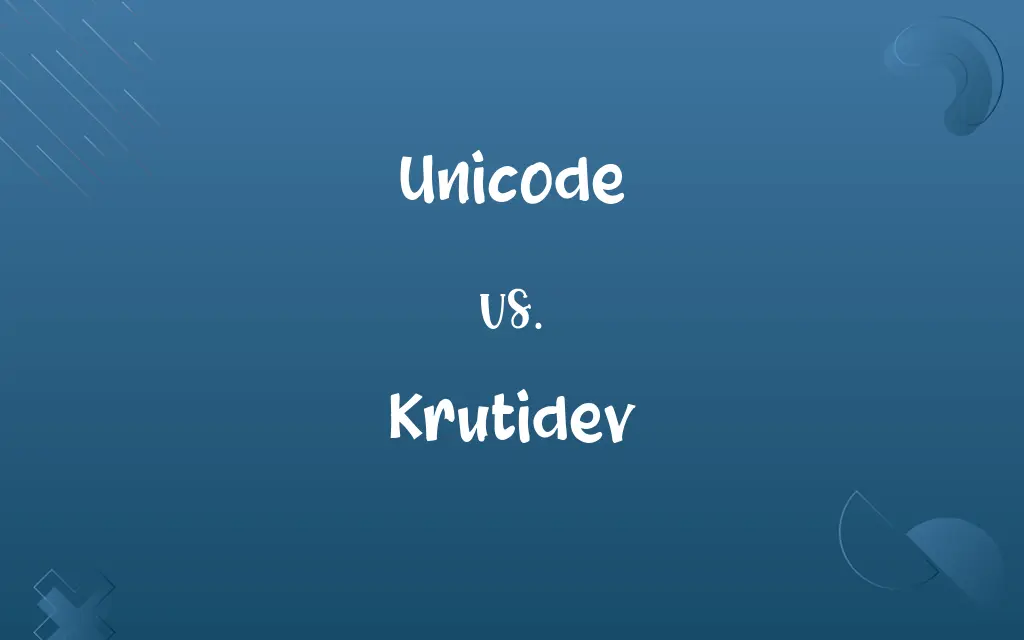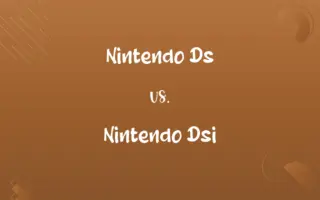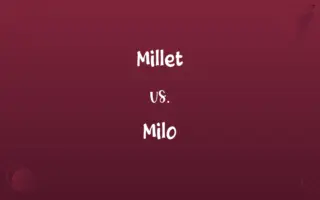Unicode vs. Krutidev: Know the Difference

By Shumaila Saeed || Published on February 8, 2024
Unicode is a universal character encoding standard used for representing text in computers. Krutidev is a popular legacy font encoding for Devanagari script, used in Indian languages like Hindi.

Key Differences
Unicode is a comprehensive character encoding system designed to represent text from multiple languages and scripts worldwide. It assigns a unique code to every character, making text processing and data exchange seamless between different systems. Krutidev, on the other hand, is a non-Unicode, font-based encoding used primarily for Hindi typing, utilizing a unique set of ASCII characters to represent Devanagari script.
Shumaila Saeed
Feb 08, 2024
The primary distinction between Unicode and Krutidev lies in their encoding approaches. Unicode provides a universal code for each character, irrespective of the platform, program, or language, ensuring global text compatibility. Krutidev, in contrast, is specific to the Devanagari script and requires specific software that understands its encoding, limiting its compatibility with modern, universal standards.
Shumaila Saeed
Feb 08, 2024
In terms of adaptability and future-proofing, Unicode has a significant advantage. It supports a wide range of characters and symbols, making it indispensable for modern computing and internet communication. Krutidev, while popular in certain regions for Hindi typing, lacks this versatility and is not as suitable for the diverse needs of global digital communication.
Shumaila Saeed
Feb 08, 2024
Unicode's ability to represent multiple languages and scripts makes it a preferred choice for multilingual environments and applications. It facilitates easy translation and data sharing across different languages and platforms. Krutidev, being specific to the Hindi language and reliant on a particular font style, does not offer such flexibility, making it less suitable for multilingual applications.
Shumaila Saeed
Feb 08, 2024
Finally, when considering the transition to digital and web-based platforms, Unicode's universal compatibility gives it an edge. Most modern software, databases, and internet protocols support Unicode, ensuring that text remains consistent across various mediums. Krutidev, due to its font-based nature, faces challenges in web and digital media, where Unicode is the standard.
Shumaila Saeed
Feb 08, 2024
ADVERTISEMENT
Comparison Chart
Encoding Type
Universal character encoding standard
Font-based encoding for Devanagari script
Shumaila Saeed
Feb 08, 2024
Compatibility
Compatible with multiple platforms and languages
Limited to specific software and Hindi language
Shumaila Saeed
Feb 08, 2024
Future-proofing
Highly adaptable for future technologies
Less adaptable, more legacy-focused
Shumaila Saeed
Feb 08, 2024
Multilingual Support
Supports numerous languages and scripts
Primarily used for Hindi
Shumaila Saeed
Feb 08, 2024
Web & Digital Use
Standard for web and digital platforms
Limited functionality in modern web use
Shumaila Saeed
Feb 08, 2024
ADVERTISEMENT
Unicode and Krutidev Definitions
Unicode
Unicode standardizes text representation in computing. Example
Unicode is essential for text processing in modern software.
Shumaila Saeed
Jan 24, 2024
Krutidev
Krutidev is a non-Unicode font system. Example
Krutidev fonts require specific software to read and write.
Shumaila Saeed
Jan 24, 2024
Unicode
Unicode is a universal coding system for text. Example
Unicode allows for the consistent representation of text in different languages.
Shumaila Saeed
Jan 24, 2024
Krutidev
Krutidev is less compatible with modern digital platforms. Example
Krutidev fonts often need conversion for use on modern platforms.
Shumaila Saeed
Jan 24, 2024
Unicode
Unicode supports an extensive range of characters and symbols. Example
Unicode can represent over 140,000 characters.
Shumaila Saeed
Jan 24, 2024
ADVERTISEMENT
Krutidev
Krutidev is specific to Hindi language typing. Example
Krutidev was the go-to choice for Hindi typists.
Shumaila Saeed
Jan 24, 2024
Unicode
Unicode ensures compatibility across platforms. Example
Unicode enables seamless data exchange between different systems.
Shumaila Saeed
Jan 24, 2024
Krutidev
Krutidev is a Devanagari font encoding. Example
Krutidev was widely used for typing in Hindi.
Shumaila Saeed
Jan 24, 2024
Unicode
Unicode assigns a unique number to every character. Example
Unicode makes it possible to encode all the world's writing systems.
Shumaila Saeed
Jan 24, 2024
Krutidev
Krutidev uses ASCII characters for Hindi script. Example
Krutidev maps Hindi characters to various ASCII values.
Shumaila Saeed
Jan 24, 2024
Unicode
A character encoding standard for computer storage and transmission of the letters, characters, and symbols of most languages and writing systems.
Shumaila Saeed
Jan 22, 2024
Repeatedly Asked Queries
How does Unicode differ from Krutidev in encoding?
Unicode provides a unique code for each character, while Krutidev uses ASCII characters for Hindi script representation.
Shumaila Saeed
Feb 08, 2024
What is Krutidev?
Krutidev is a legacy font-based encoding system used for typing in the Devanagari script.
Shumaila Saeed
Feb 08, 2024
Can Krutidev be used for languages other than Hindi?
Krutidev is primarily designed for Hindi and has limited use for other languages.
Shumaila Saeed
Feb 08, 2024
Is Unicode suitable for web and digital platforms?
Yes, Unicode is the standard for text representation on modern digital platforms.
Shumaila Saeed
Feb 08, 2024
Are Krutidev fonts compatible with modern software?
Krutidev fonts may require specific software or conversion tools for compatibility.
Shumaila Saeed
Feb 08, 2024
Why is Krutidev considered a legacy system?
Krutidev is based on older, font-specific encoding, making it less adaptable to modern digital needs.
Shumaila Saeed
Feb 08, 2024
What is Unicode?
Unicode is a universal character encoding standard for text representation in computing.
Shumaila Saeed
Feb 08, 2024
Is Unicode compatible with multiple languages?
Yes, Unicode supports a wide range of languages and scripts.
Shumaila Saeed
Feb 08, 2024
How does Unicode support global communication?
Unicode's universal character set facilitates seamless global communication and data exchange.
Shumaila Saeed
Feb 08, 2024
Does Unicode facilitate multilingual applications?
Yes, its extensive character set makes Unicode ideal for multilingual environments.
Shumaila Saeed
Feb 08, 2024
Is Krutidev still widely used?
Krutidev usage has declined due to the rise of Unicode and its wider compatibility.
Shumaila Saeed
Feb 08, 2024
Can Unicode represent emojis and symbols?
Yes, Unicode includes a vast range of characters, including emojis and symbols.
Shumaila Saeed
Feb 08, 2024
How does Krutidev handle non-Hindi characters?
Krutidev is not designed for non-Hindi characters, leading to limited functionality.
Shumaila Saeed
Feb 08, 2024
Are there any limitations to using Krutidev?
Krutidev has limitations in compatibility, especially on modern digital platforms.
Shumaila Saeed
Feb 08, 2024
Is Unicode essential for modern software development?
Yes, Unicode is crucial for developing software that handles diverse text data.
Shumaila Saeed
Feb 08, 2024
Can Krutidev be converted to Unicode?
Yes, there are tools available to convert Krutidev text to Unicode format.
Shumaila Saeed
Feb 08, 2024
What future developments are expected for Unicode?
Unicode continually updates to include new characters and symbols, catering to evolving global needs.
Shumaila Saeed
Feb 08, 2024
Does Krutidev support ASCII characters?
Krutidev uses ASCII characters uniquely mapped to represent the Hindi script.
Shumaila Saeed
Feb 08, 2024
What makes Unicode universally accepted?
Its comprehensive support for characters and compatibility across platforms.
Shumaila Saeed
Feb 08, 2024
How does Unicode affect global data sharing?
Unicode standardizes text representation, making global data sharing more efficient.
Shumaila Saeed
Feb 08, 2024
Share this page
Link for your blog / website
HTML
Link to share via messenger
About Author
Written by
Shumaila SaeedShumaila Saeed, an expert content creator with 6 years of experience, specializes in distilling complex topics into easily digestible comparisons, shining a light on the nuances that both inform and educate readers with clarity and accuracy.









































































